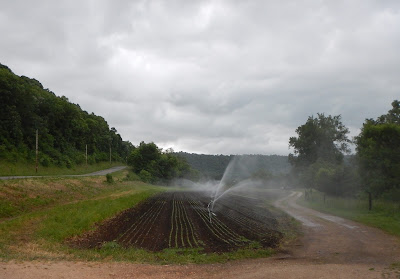💦How Quickly The Picture Can Change: Lets Talk Irrigation💦
By Farmer Richard de Wilde
Our last farm report was all about a six week run of cool and wet weather. Despite the challenges we faced, we planted all of our heat loving crops because we figured the warmer weather would come eventually! And it did come. We quickly changed course from chilly days and nights to three full weeks of 80’s and 90’s with NO RAIN! Our irrigation equipment, which had seen very little use for the last two years, has suddenly been needed everywhere! Our irrigation crew, under Vicente’s guidance, became a full time job. This crew has worked long days, and has gotten up in the middle of the night to check pumps or turn off irrigation when it is finished. Many things can go wrong: Leaks, problems with pumps, etc. It takes a dedicated, diligent and determined crew to keep up with irrigation during a time like this.
Every crop has different water needs. Since we have a lot to water right now, we use sensors buried six inches deep in fields to help us monitor moisture in different crops so we can prioritize our watering schedule. They have to be “read” every day or two so we know how to plan our irrigation schedule.
We have three main types of irrigation we use. The first type is Buried Drip Tape. We’ve used this method for many years with crops that are planted on plastic mulch, such as tomatoes and onions. In recent years we’ve also started to use this tape on bare ground crops such as kale. The benefit of drip irrigation is that you can feed the plants water and fertilizer right at their roots. No evaporation loss, so it only requires ⅓ to ½ the amount of water needed with overhead methods. The other benefit is that the watering is more specific so you don’t water as many weed seeds!
The second type of irrigation we use is Sprinklers. Germinating
seeds is another matter that relies on consistent observation of moisture in
the soil. Small seeds in particular,
such as carrots, need to be planted shallow, ¼ to ½ inch deep. They need moist soil to germinate, so if the top
layer of soil is dry and there’s no rain in the forecast, we have to provide
the moisture in order for the seed to germinate. This is where we often use sprinklers to either
pre water several days before planting or immediately after a planting. Larger seeds, such as sweet corn and beans,
are planted 2 inches deep. Most of the
time we can plant deep enough to get to moisture and these crops often come up
well without having to water. In fact, that’s what happened! We planted and the seeds did germinate. We also use sprinklers to water transplants
that have just been put out in the fields, such as broccoli or lettuce. The down side to sprinklers is that it takes
a lot of time to lay out all of the pipe and then the pipe has to be picked up
and moved before we can take other equipment into the field to cultivate. The sprinklers also have a wider area that
they water, so they do water weed seeds as well.
Lastly, we have an irrigation tool we call “The Gun.” This is an overhead sprinkler that has a long
hose mounted on a reel that can be travel slowly across a field with water
pressure. With one large nozzle, this
can deliver 150 gallons of water a minute.
This equipment has a high initial investment cost, but the benefit is
that it can be set up with only 2 people.
It does require a straight line and level ground to work properly, so we
can’t use it in all of our fields.
Our main crew includes Vicente, Manuel, Juan Pablo, Rafael
and Alejandro, although other crew members have stepped in when additional
hands are needed. Of course, there are
always repairs, so we can’t forget to thank Juan for helping us keep the
equipment running!
If you come to our
Strawberry Day party this weekend, please take a moment to thank our awesome
irrigation crew for their hard work. We
did get one inch of rain earlier this week, for which we are very
grateful. We can’t water everything,
which reminds us we’re at the mercy of Mother Nature sometimes. We continue to do the best job we can and
remember that every year of farming is different.
💦





No comments:
Post a Comment